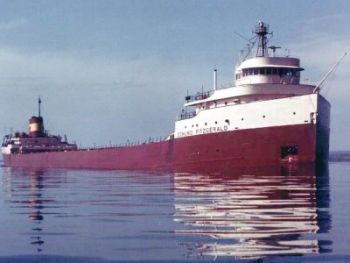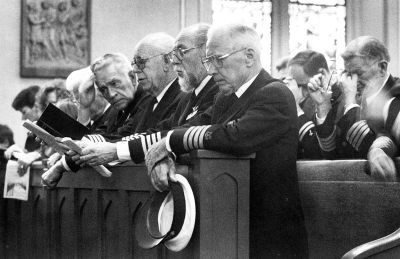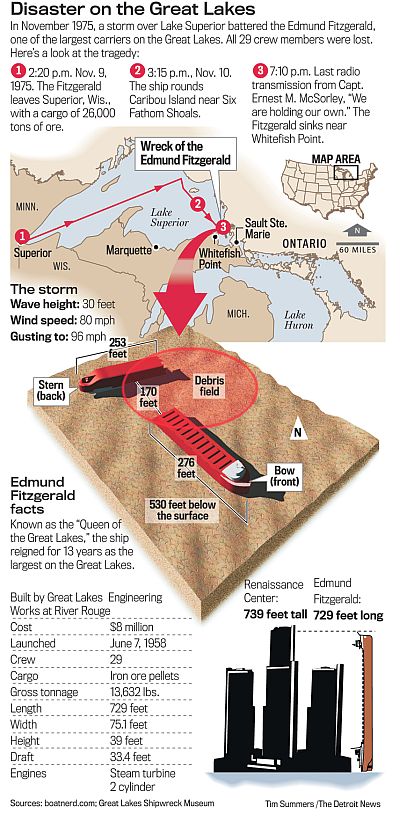
Publisher:
Bonnie King
CONTACT:
Newsroom@Salem-news.com
Advertising:
Adsales@Salem-news.com

~Truth~
~Justice~
~Peace~
TJP
Nov-12-2015 19:15


 TweetFollow @OregonNews
TweetFollow @OregonNews
The Wreck of The Edmund Fitzgerald: 40 Years Ago
Bonnie King Salem-News.comGordon Lightfoot said this song is his most significant contribution to music.
 SS Edmund Fitzgerald Courtesy: NOAA |
(SALEM, Ore.) - 40 years ago, on November 10, 1975, the SS Edmund Fitzgerald sank in Lake Superior. This two score anniversary commemorates the ship, a 729 foot ore carrier, which went down in a November storm, taking all 29 crew members to their graves.
Most of us (outside the area) know about the tragedy because of one thing: the song.
The poignant song was written by Gordon Lightfoot as a tribute to the ship, the sea and the men who lost their lives in this mysterious shipwreck.
The fateful voyage began November 9, 1975 at 2:20 p.m.
The Edmund Fitzgerald's Captain Ernst McSorely was a seasoned sailor of the Great Lakes with 44 years of experience.
Captain McSorley left Superior, Wisconsin with a load of 26,116 tons of taconite pellets to be delivered to Zug Island, charting his course within ten miles of another ship, the Anderson, so that they could navigate Lake Superior together.
There was a storm brewing and heading northward towards the Great Lakes. It appeared to be a "typical November storm".
As the storm increased in intensity that afternoon, Captain McSorley reported that the Fitz "had a bad list, had lost both radars, and was taking heavy seas over the deck in one of the worst seas he had ever been in." The ship had lost two vent covers, some railing and was taking on water.
He asked for a radar fix because his radar had failed. Darkness set in and snow squalls made the Fitz nearly invisible.
At 7:10 p.m. the Anderson’s Captain Cooper called Captain McSorley to check the condition of the Fitz. Captain McSorley replied, “We are holding our own.”
Just fifteen minutes later, as the Anderson emerged from a snow squall, Cooper couldn’t believe his eyes. The Edmund Fitzgerald had disappeared from sight and sound.
The ship couldn’t be seen visually or on radar, or contacted by radio. Captain Cooper called the Coast Guard and reported “the Fitz is gone.”
Three days later a Navy helicopter and the Coast Guard found the wreckage of the Edmund Fitzgerald approximately 17 miles from the entrance to Whitefish Bay. No bodies were ever recovered.
Gordon Lightfoot read the article in Newsweek Magazine two weeks after the ship sank, in the issue of November 24, 1975, and was inspired. That is when he wrote what has turned out to be his most famous song, and one of the greatest “story songs” ever, The Wreck of The Edmund Fitzgerald.
The song climbed to #2 on the Billboard pop charts in 1976 and remains one the most heartwrenching ballads ever written, and a highlight of every Lightfoot concert. Five years ago, he made a correction to a line in the song.
As a result of recent findings that it was waves and not crew error that lead to the wreck, Lightfoot changed “At seven PM, a main hatchway caved in” to “At seven PM, it grew dark, it was then” (see lyrics below).
A Canadian documentary called Edmund Fitzgerald (Watch on the History Channel) concludes there is little evidence that failure to secure the ship's hatches caused the sinking and that it was a rogue wave instead.
Lightfoot said he always felt bad that the line might have implied that the crew was at fault, and was very happy that the new evidence absolved them.
"I can't use the hatch cover line anymore. And the whole verse was really conjecture right from start to finish anyway. It's the only verse in the whole song where I give myself complete poetic license,” Lighfoot said in an exclusive interview with QMI Agency.
In a 2010 article in the Toronto Sun, he said he has no plans to change the copyrighted lyrics of the song and re-record it and that the lyrics change will be incorporated only into live performances.
 Mariners’ Memorial, 1988 |
If you missed the commemoration, come back in 2016.
Every year, on November 10th at 7:10 p.m., during the museum's annual memorial service, the bell is tolled 29 times for the Fitzgerald's crew, plus a 30th time to honor the estimated 30,000 victims on more than 6,000 ships that have gone down on the Great Lakes since the 1600s.
Wreck Of The Edmund Fitzgerald
The legend lives on from the Chippewa on downof the big lake they called "Gitche Gumee."
The lake, it is said, never gives up her dead
when the skies of November turn gloomy.
With a load of iron ore twenty-six thousand tons more
than the Edmund Fitzgerald weighed empty,
that good ship and true was a bone to be chewed
when the "Gales of November" came early.
The ship was the pride of the American side
coming back from some mill in Wisconsin.
As the big freighters go, it was bigger than most
with a crew and good captain well seasoned,
concluding some terms with a couple of steel firms
when they left fully loaded for Cleveland.
And later that night when the ship's bell rang,
could it be the north wind they'd been feelin'?
 The wind in the wires made a tattle-tale sound
The wind in the wires made a tattle-tale soundand a wave broke over the railing.
And ev'ry man knew, as the captain did too
'twas the witch of November come stealin'.
The dawn came late and the breakfast had to wait
when the Gales of November came slashin'.
When afternoon came it was freezin' rain
in the face of a hurricane west wind.
When suppertime came the old cook came on deck
Sayin' "Fellas, it's too rough t'feed ya."
At seven P.M. it grew dark, it was then he said*,
"Fellas, it's bin good t'know ya!"
The captain wired in he had water comin' in
and the good ship and crew was in peril.
And later that night when 'is lights went outta sight
came the wreck of the Edmund Fitzgerald.
Does any one know where the love of God goes
when the waves turn the minutes to hours?
The searchers all say they'd have made Whitefish Bay
if they'd put fifteen more miles behind 'er.
They might have split up or they might have capsized;
they may have broke deep and took water.
And all that remains is the faces and the names
of the wives and the sons and the daughters.
Lake Huron rolls, Superior sings
in the rooms of her ice-water mansion.
Old Michigan steams like a young man's dreams;
the islands and bays are for sportsmen.
And farther below Lake Ontario
takes in what Lake Erie can send her,
And the iron boats go as the mariners all know
with the Gales of November remembered.
In a musty old hall in Detroit they prayed,
in the "Maritime Sailors' Cathedral."
The church bell chimed 'til it rang twenty-nine times
for each man on the Edmund Fitzgerald.
The legend lives on from the Chippewa on down
of the big lake they call "Gitche Gumee."
"Superior," they said, "never gives up her dead
when the gales of November come early!"
(*revised lyric)
Music and lyrics ©1976 by Gordon Lightfoot
Sources: Toronto Sun; Gordon Lightfoot.com; ecorse along the detroit river; detroitnews.com; & others.
 |
Articles for November 12, 2015 | Articles for November 13, 2015

Salem-News.com:
googlec507860f6901db00.html



Terms of Service | Privacy Policy
All comments and messages are approved by people and self promotional links or unacceptable comments are denied.
[Return to Top]
©2025 Salem-News.com. All opinions expressed in this article are those of the author and do not necessarily reflect those of Salem-News.com.